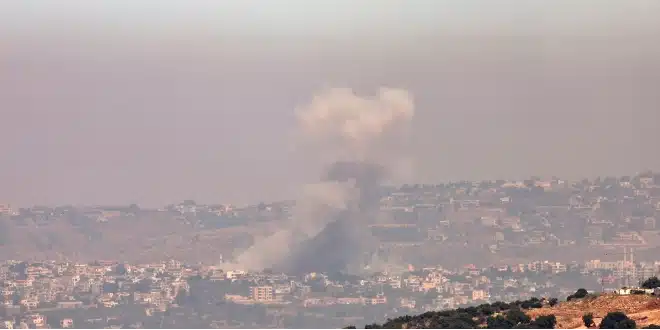The Israeli army has announced that it has “approved and validated” plans for an offensive in Lebanon, amid escalating clashes with Hezbollah and a relative lull in Gaza.
The ongoing conflict in Gaza has increased regional tensions, with daily exchanges of fire between Israeli forces and Hezbollah, an ally of Hamas backed by Iran.
The army’s statement followed a meeting of commanders for a situational assessment and came after Israeli Foreign Minister Israel Katz threatened Hezbollah with destruction in a “total war.”
This announcement coincides with a daily “pause” in military activity in Rafah, southern Gaza, to facilitate aid during the Muslim Eid al-Adha holiday.
In central Gaza, reports from witnesses indicated gunfire and artillery shelling near the Nuseirat refugee camp, where at least 13 people were killed in two separate strikes on a family home and a commercial building, according to the civil defense agency. Al-Awda hospital reported receiving the bodies of six people and treating 15 wounded from various areas in central and southern Gaza.
Despite the brief pause in Rafah, fighting continued elsewhere in Gaza. The Israeli army confirmed ongoing operations in central and southern Gaza, including Rafah.
U.S. President Joe Biden, in an Eid al-Adha message, reiterated his call for a ceasefire plan he proposed last month, describing it as the best way to end the violence. U.S. envoy Amos Hochstein suggested the plan would end the Gaza conflict and reduce fighting between Israel and Hezbollah.
However, Israeli Foreign Minister Katz stated that Israel is close to changing its approach to Hezbollah and Lebanon, warning of severe consequences in a “total war.”
Hezbollah released a video showing drone footage over northern Israel, including Haifa, increasing tensions further.
Biden’s ceasefire proposal includes a six-week pause in fighting, with Hamas releasing hostages in exchange for Palestinian prisoners held by Israel.
Israeli Prime Minister Benjamin Netanyahu faces growing domestic criticism for his handling of the Gaza war and hostage crisis. Thousands protested in front of parliament in Jerusalem, calling for early elections and renewed negotiations for hostage release.
In Rafah, despite the announced pause, Israeli military vehicles and shelling were reported in other areas. The October 7 attack by Palestinian militants in southern Israel resulted in 1,194 deaths and the capture of 251 hostages, with 116 still held in Gaza.
Israel’s response has led to the deaths of at least 37,372 people in Gaza, mostly civilians. U.N. rights chief Volker Turk condemned the “unconscionable death and suffering” and the disregard for international human rights.
Humanitarian access to Gaza remains severely restricted due to insecurity, closed crossing points, and Israeli procedural delays, further deteriorating since early May when the Rafah crossing was seized and closed.
Hamas has demanded the opening of the Kerem Shalom and Rafah crossings, accusing Israel and the U.S. of using aid restrictions as political leverage. Displaced Palestinians in Gaza, like Ali Hassan in Deir al-Balah, are facing severe hardships during Eid al-Adha, lacking basic necessities such as meat, sacrificial animals, and clothing for children.


